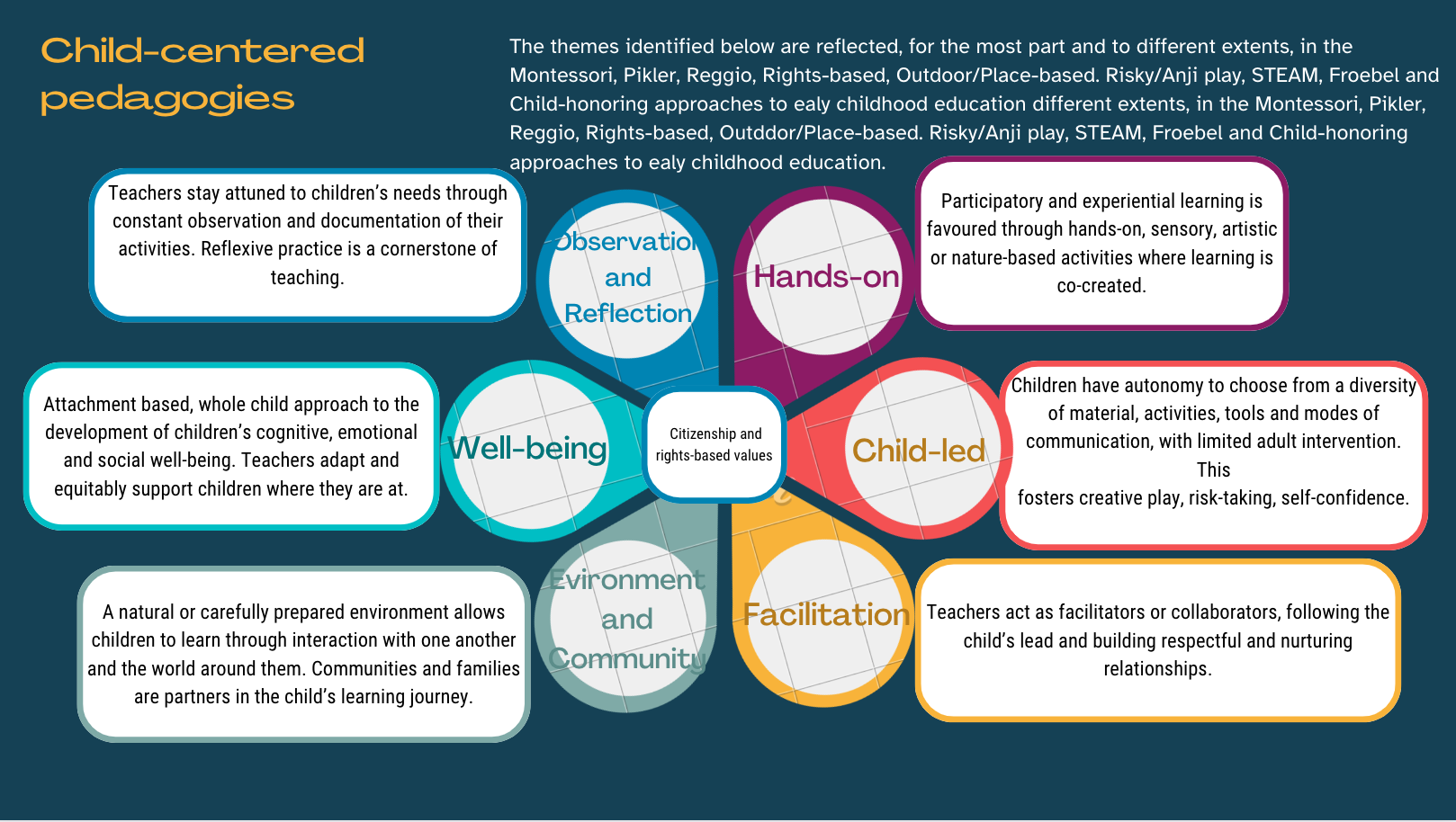Activity 3.1 | Importance of the ECE sector
| Site: | RRU Open Educational Resources |
| Cours: | Leading and Innovating in the Early Childhood Education Sector |
| Livre: | Activity 3.1 | Importance of the ECE sector |
| Imprimé par: | Visiteur anonyme |
| Date: | mercredi, 28 janvier 2026, 14:04 |
Activity 3.1 | Introduction
In Topic Three's first activity, you will consider the importance of the ECE sector, and you will examine evidence-based research validating the sector’s importance.
Furthermore, you will ponder the impact of early childhood education on broader society and how it plays a pivotal role in shaping children's cognitive and social-emotional development and lays the foundation for future humankind.
Additionally, you will consider your influence as an ECE manager and leader as an advocate for policy change, educational reforms, and the ability to shape public perception and awareness of the significance of the sector.
Finally, you will visualize and broadly define your goals as a first step toward creating an advocacy action plan.
After completing the various learning events within Activity 3.1, you will be able to:
- Identify your role in the ECE system to advocate for change, and
- Describe ways to encourage reflective and reflexive practices in ECE programs as an ECE leader.
- Readings
- Watching Videos
- Self-reflection
- Visualization and goal setting
Importance of the ECE sector
Shaping future humans
Haneefah Shuaibe-Peiters (2019), an ECE practitioner, leader, and advocate, argued that early childhood education is more than simple kindergarten readiness; in fact, she contends that these experiences are a "pre-society" and are so impactful that early childhood education should be viewed as the foundation for developing culturally, morally conscious and literate leaders in modern society.
Watch Haneefah's (2019) TEDx talk and then reflect on the provided questions:
After watching the video, reflect on the following questions:
- In what ways do you ensure that your programming practices prioritize the holistic development of children to lay a foundation for positive societal contributions in the future?
- How are you actively contributing to the discourse to position quality childcare as a key driver of positive societal impacts?
- What policies need to be changed to impact future society positively? What could you do to advocate for these policy changes?
Reading One | Working towards change
ECE Leadership Advocacy
ECE leadership can take many forms. To see some of the ways early childhood educators in BC have taken up leadership and advocacy watch the following,
Langford and Richardson's (2019) chapter three, "Working Towards Change," contextualizes and critiques the landscape and state of the ECE workforce. The authors examine the impact of policies, working conditions, and professionalization of the industry and consider what needs to change to move the needle forward.
Read the chapter and then answer the provided reflective questions.
After reading the chapter, reflect on the following questions:
- What actions might you take to support the advancement of politics, policies, and practices to address inequities and gendered injustices in the ECE profession? (p. 30)
- What organizations, initiatives, or campaigns could you explore or create to support advocacy efforts?
Langford, R., & Richardson, B. (2019). 3 Working towards change. Teachers' and Families' Perspectives in Early Childhood Education and Care: Early Childhood Education in the 21st Century. Vol. II, 25. Taylor & Francis.
Reading Two | Effective ECE Leadership
Siraj et al. (2022) postulated that effective ECE management and leadership are crucial for delivering quality early childhood education. Furthermore, the authors considered how "good" leaders and managers impact children's learning, health and well-being, support and motivate ECE teachers, foster positive learning environments, and promote strong partnerships with families.
Read the chapter summary and then answer the provided reflective questions.
After reading the summary, answer the following questions:
- How do current policies impact your ability to make critical decisions about your programming, the physical environment, staff, and resources? What should change? Why?
- What type of training(s) could support you in further developing leadership, pedagogical, and administrative management skills and knowledge to optimize your leadership potential?
Reference
Siraj, I. et al.(2022). The role of management, leadership, and monitoring in producing quality learning outcomes in Early Childhood Education. Quality Early Learning: Nurturing Children’s Potential. Human Development Perspectives. Washington, DC: World Bank.
Advocating for change
Identifying Your Advocacy Goals
After examining the impact of early childhood education on broader society, it is evident that your role as an ECE manager and leader is pivotal, though not consistently recognized. It can feel overwhelming when you become aware of the work needed to raise awareness and make meaningful change.
You may not think of yourself as an "advocate", but you have already advocated if you have ever:
- Helped a family receive needed services,
- Stood up for someone who was being treated unfairly, or
- Attended conferences, city council meetings or other events highlighting injustice and exploring actions for change.
You can move into more active advocacy for policy change and educational reforms that prioritize ECE education, and that can potentially shape public perception and awareness. After completing all activities in Topic Three, you will create an action plan to share with others to begin your advocacy journey. The first step towards making your action plan is to identify your goals.
Identifying your goals
To identify your goals, you are encouraged to do one or both of the following activities:
- Visualize your preferred future
Imagine you have just woken up, and it is five years in the future. You realize that your program and the ECE sector are exactly as you have hoped they would be - what has changed? What policies have been put into place? What are the working conditions like? Visualizing your preferred future makes you likelier to see your imagined potential come to light.
Creating child-centred spaces

Creating child-centred spaces can take many forms.
In thinking about ways to bring elements of child and pedagogy into your ECE space, review this infographic. Consider what elements of the infographic are relevant in your setting and how you might introduce approaches that further centre children. Consider what elements might not work in your setting and why?
